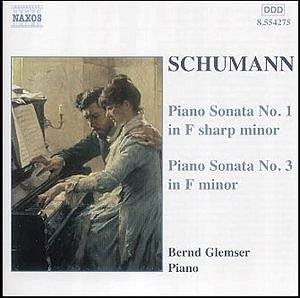The first phase of Schumann's creative life - the 1830s - was devoted entirely to piano music, and of this rich collection of works the grouped collections of miniatures such as Carnaval and Kreisleriana have created the most lasting impression.
These works brought a new priority which was very much of the new romantic era, but at the same time Schumann maintained his allegiance to the great traditions of which he felt he was also a standard bearer. And in the case of piano music that clearly meant the sonata. The three sonatas date from the mid-1830s, and like his symphonies these pieces have suffered a mixed critical reaction over the years. The reason is not altogether difficult to understand, for while showing an allegiance to the sonata principle as far as structure is concerned, the textures are dense and the manner is so romantic, so full of passionate feeling, that the music follows its own muse. On closer acquaintance these somewhat neglected works are all the better for these idiosyncrasies.
The opening of the F sharp minor Sonata sets a fine standard, beautiful in manner and tone. This is a fine recording as far as sheer quality of sound is concerned, and all credit to the engineers. But the performance is about more than beauty of tone, as the earnest development of the principal theme shows. Bernd Glemser is an artist at the very peak of his form here, serving the music particularly well.
The performance of the more ostentatiously virtuosic F minor Sonata is no less fine. Glemser handles its notoriously complex structure with some assurance and achieves conviction in the process. Such is the grandness of manner that Schumann's published labelled the work 'Concert sans orchestre, a label which stuck even after Schumann had made a thorough revision in 1853, towards the end of his tragically short life. (It is this revised version which is recorded.)
In pianistic terms the F minor Sonata is as challenging as anything Schumann composed, though it does not always lie gratefully for either the player or, come to that, the audience. The fact that it closes Prestissimo possibile says it all. Glemser responds to the challenge, and for him the Prestissimo certainly is possibile, becoming the logical outcome of the challenge represented by the entire work. For this is an excellent Schumann disc, a real tour-de-force.
Terry Barfoot


